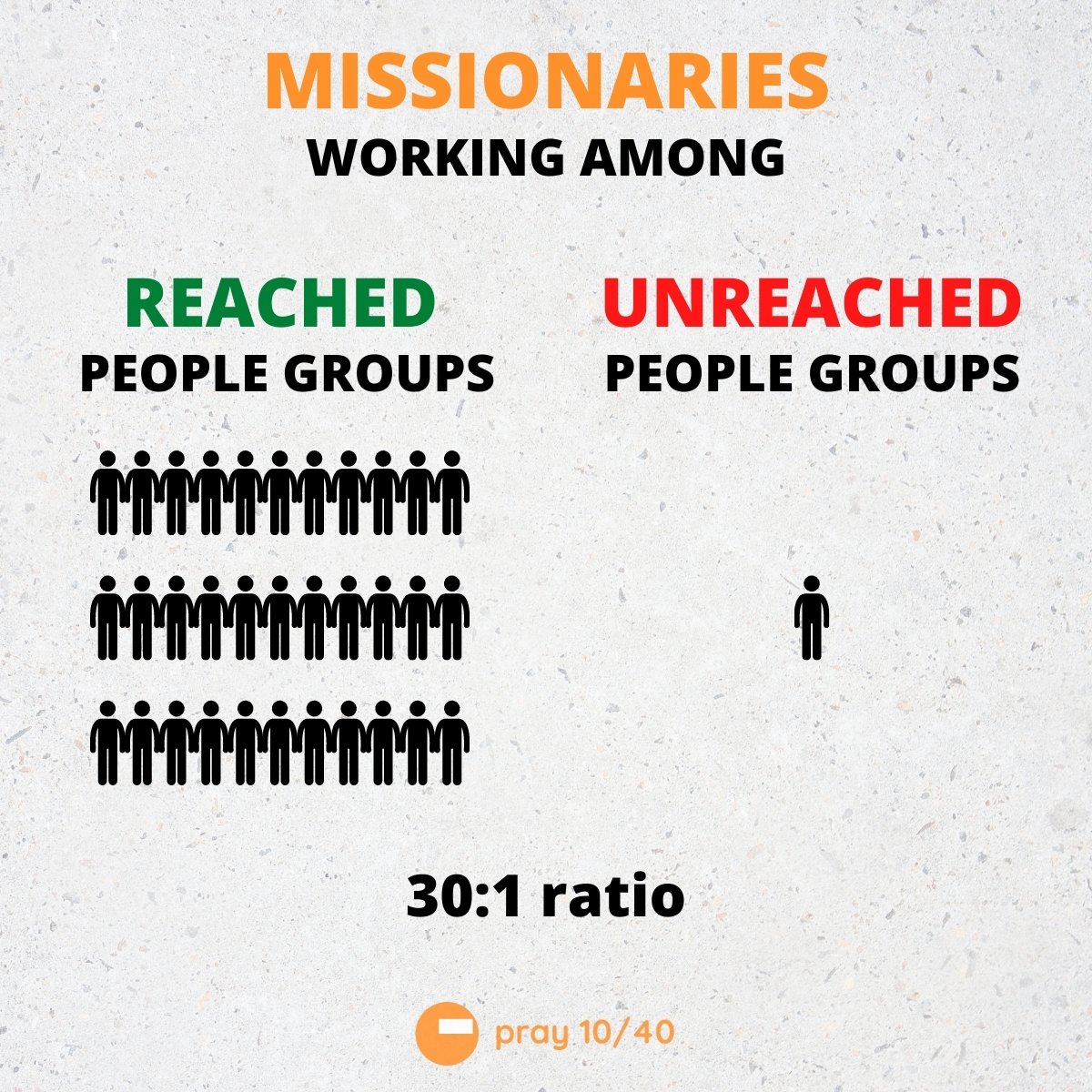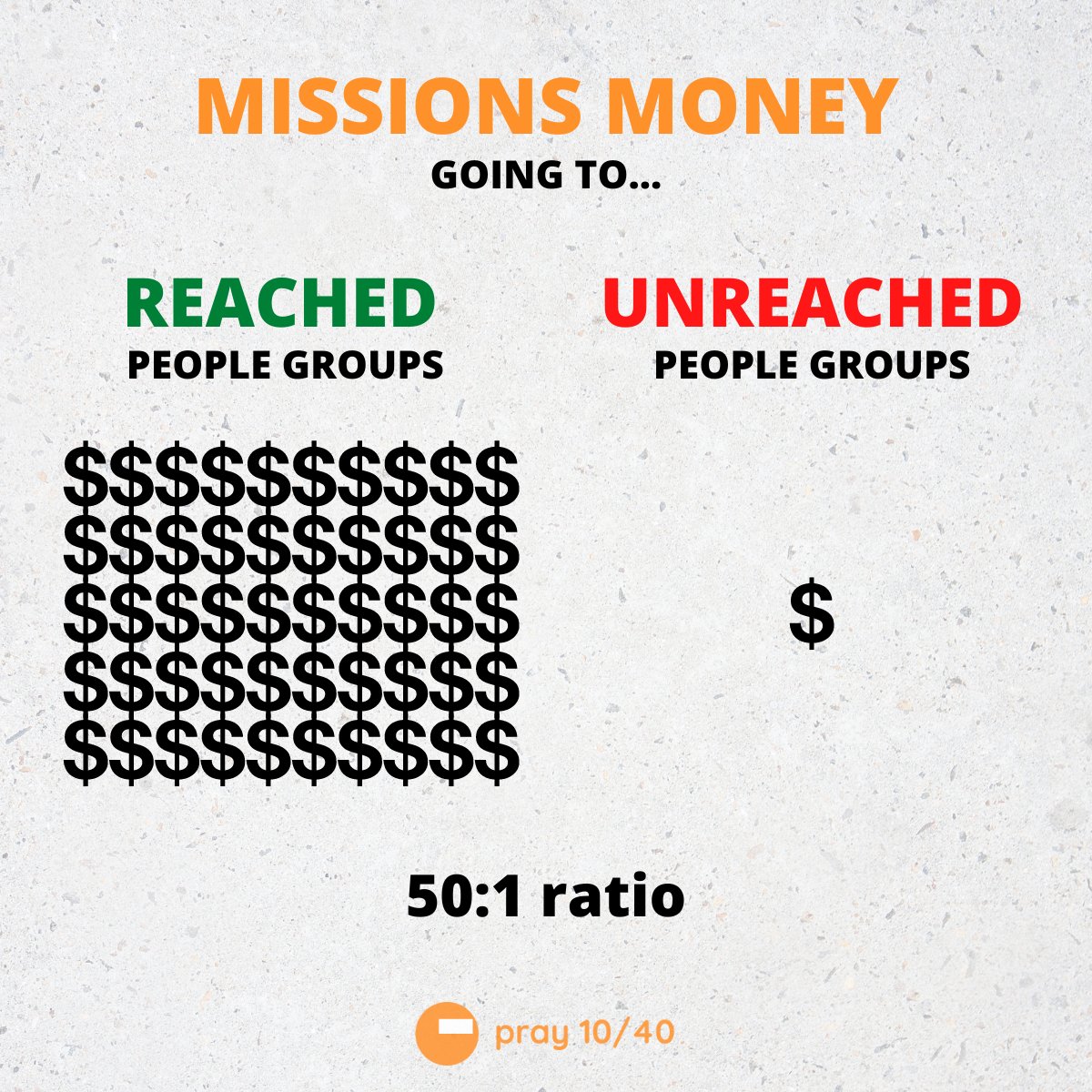The Great Imbalance refers to the disproportionate number of missionaries and money that are sent to reached vs. unreached people groups. This is a major challenge in global missions because it means that the world’s least-reached peoples are receiving relatively little focus from the global church.
The Great Imbalance of Missionaries
There are approximately 435,000 global foreign missionaries in the world, but only an estimated 11,700 are serving among unreached people groups.
That means that for every 1 missionary working among unreached people groups, there are 30 working in already reached places!

The Great Imbalance of Money
Of the $15 billion given to global missions annually by the global church, only $0.25 billion went to the unreached. (source)
That means that for every $1 that goes to the unreached, at least $50 goes to already reached places.

It makes sense that the money given to global missions follows the missionaries and the vast majority of missionaries are going to already reached places.
Causes
Numerous factors are contributing to the Great Imbalance:
- Lack of Awareness – the average Christian is unaware that the Great Commission is a command from Jesus for the church to disciple nations (ethne, or ethnic groups) so they are unaware of what an unreached people group is, where they are located, and the importance of reaching them.
- Proximity – 97% of people living in unreached people groups live in the 10/40 Window, but the resourced Western church lives far from the 10/40 Window making eye-opening and heart-capturing short-term mission trips to unreached people groups relatively time-consuming and expensive compared to closer locations.
- Misaligned Priorities – Churches often prioritize funding projects where immediate, tangible results can be seen (building projects etc.) and people that will have a higher likelihood of seeing lost individuals saved.
- Ease, Comfort, and Safety – It’s simply easier, more comfortable and typically safer to work in places that have higher percentages of Christians.
- Safety – The World Watch List ranks the top 50 countries that are experiencing Christian persecution. The map of these countries is basically a map of the 10/40 Window, where 97% of the world’s unreached people live.
How to Rebalance the Great Imbalance
Rebalancing the Great Imbalance starts with you.
When a Christian decides to become a disciple of Jesus Christ, many look at their current life and try to “Christianize” what’s already there without laying everything on the altar first – career, financial security, safety, pride, family approval, future spouse etc.
But the call of Christ is to the death of the old life and to the resurrection of a completely new life built on the foundation of being a disciple of Jesus and following His commands – importantly, the Great Commission.
The Great Commission is not simply to “go therefore and make disciples” but to “go therefore and make disciples of all nations (ethne)“. This nations-focus is in line with God’s Heart for the Nations seen throughout Scripture and requires special focus and sacrifice.
Having a “WIGTAKE” mentality
God is raising up people around the world that are willing to lay everything on the altar and ask the question, “What’s it gonna’ take to see the Great Commission fulfilled among the world’s remaining unreached people groups?” with their newly resurrected lives. This is called having a “WIGTAKE” mentality.
These disciples of Jesus are asking, “How can I give my time, talent and treasure to reaching the unreached with my resurrected life?”
Get Started
To get started, spend some with the Lord (either individually or with others) studying the teachings of Jesus in the gospels and asking what aspects of your life need to be laid on the altar.
Then ask the Lord how you can give of the time, talent and treasure that He has entrusted to you to help reach the unreached. Here are a few practical ideas:
- Time – Spend time in prayer each week praying for 10/40 Window Countries, the Persecuted Church, and Frontier People Groups.
- Talent – Get training in catalyzing church planting movements among the unreached, then Go to the nations! Explore the Go section of our Get Involved page to learn how you can get training to become a career missionary.
- Treasure – Give directly to the people and projects that are actively reaching the unreached by joining the 1% (joining Christians around the world who are giving at least 1% of their income directly to the unreached).
Here are the projects we are currently crowdfunding through generous Christians like you:
FAQ
Yes! This article isn’t saying that missionaries shouldn’t go to already reached places. There are needs everywhere and Christians should go help meet those needs! But the most basic, eternal need is to have the opportunity to respond to the gospel. That need is most acutely experienced by people living in unreached people groups and disproportionately few resources (missionaries and money) are going to meet those needs.
No! We, as Christians, are all part of one body and each part has its role to play. Some Christians have laid their entire lives on the altar and asked the Lord what He wants them to do and He has led them to already reached places to meet other needs… praise the Lord! Our hope in bringing attention to the Great Imbalance is that the Holy Spirit would use this information to lead more people devote their lives to bringing access to the gospel to more unreached people groups.
The answer to this question greatly depends on what your definition of “sovereignty” is. People with a high view of God’s sovereignty would simply answer “yes”. But people who put more weight into God delegating His sovereignty to His people and giving us the ministry of reconciliation would say that a large part of God’s people’s willingness and openness to going to the unreached is dependent on us.



